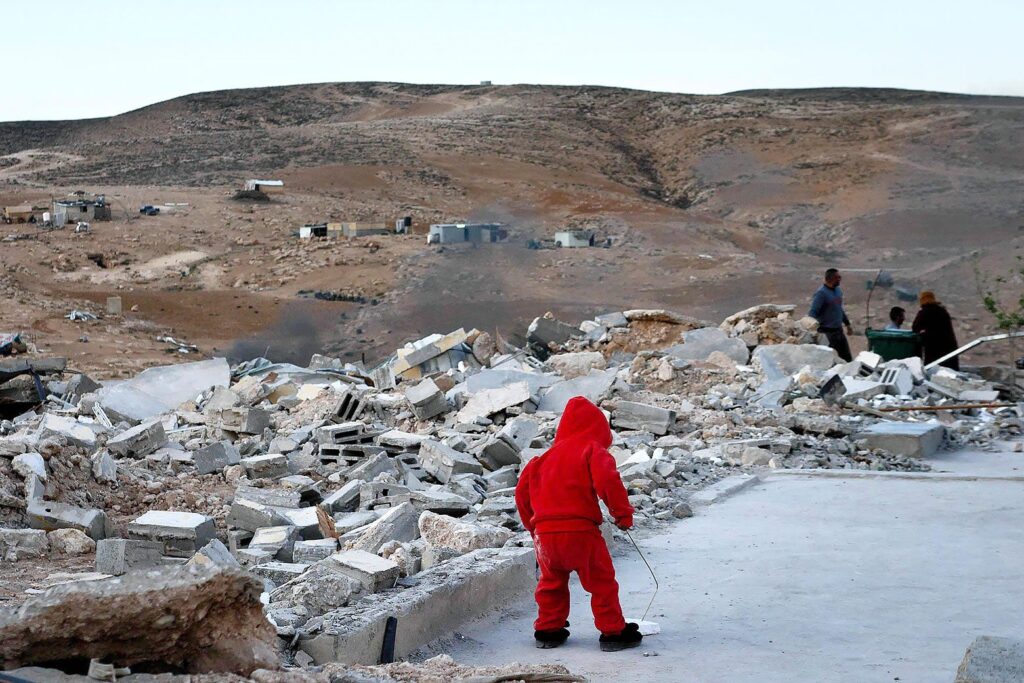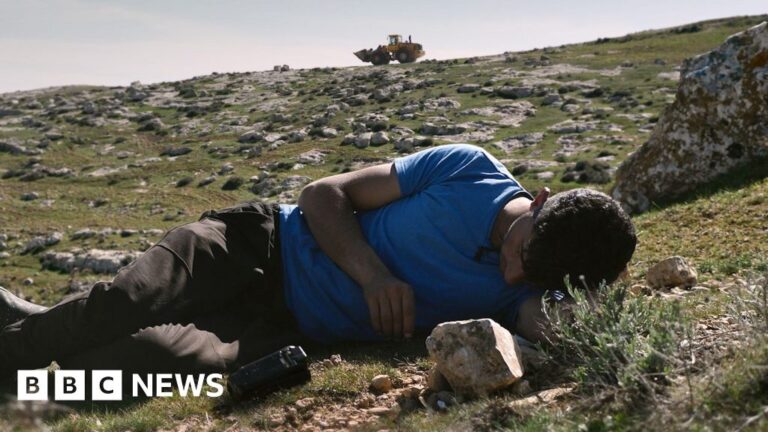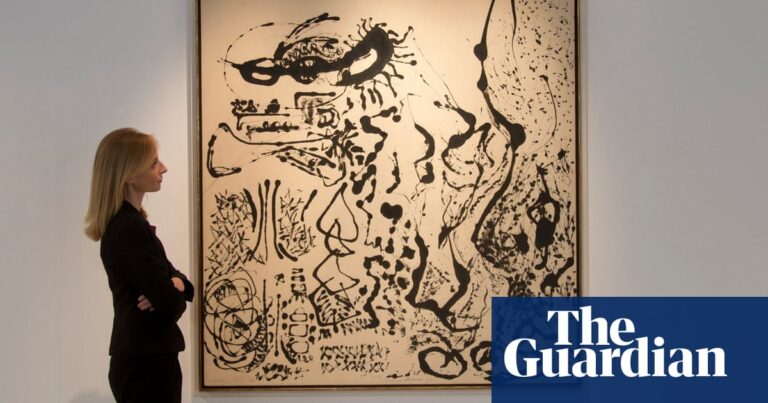
It’s far from the most important consequence of Donald Trump’s stated plan to displace the roughly 2 million Palestinians in Gaza and redevelop their land as a series of luxury resorts, but we now know, beyond all but the faintest shadow of a doubt, what movie is winning this year’s Academy Award for Best Documentary Feature. Even before Trump, sitting alongside Israeli Prime Minister Benjamin Netanyahu, announced his intention, in what Slate’s Fred Kaplan called “the craziest remarks about the Middle East that any American president has uttered in history,” No Other Land, which was shot between 2019 and 2023 in the Masafer Yatta region of the West Bank, was already considered the front-runner, buoyed by unanimous support from the top critics groups and its powerful depiction of Palestinians resisting the destruction of their homes by the Israeli government. But especially with the opportunity to protest Trump’s anti-trans onslaught by voting for Emilia Pérez being complicated by the racist and Islamophobic tweets of the trans person most prominently associated with the film, No Other Land now stands as the cleanest and clearest way for the academy to send a message to the world.
For all the self-congratulation that gesture might involve, there’s a bitter irony to the possibility that, for the second year running, the award would be won by a movie that openly questions its own effectiveness, interrogating the idea that pointing a camera at injustices and conveying them to the larger world necessarily results in any change. The film’s directing team is split between two Palestinians, Basel Adra and Hamdan Ballal, and two Israelis, Yuval Abraham and Rachel Szor, and as they spend years capturing a string of grindingly familiar images—Israeli bulldozers demolishing homes and schools, situated on ground their government says is necessary to conduct live-fire military exercises—the filmmakers debate on camera just what it is they’re accomplishing. Adra, the son of a Palestinian activist, recalls when a seven-minute visit by Tony Blair, and the sea of news cameras that surrounded him, was enough to convince the Israeli government to call off planned demolitions. But there are no photo ops now, and in a time when simply editing the Wikipedia pages on the Israeli–Palestinian conflict can have dire consequences for the editors, much of the mainstream media has opted for a stance of cautious, even tepid, neutrality, and Americans’ interest has cooled accordingly. (No Other Land, which premiered in February 2024, was completed the previous fall, before the Oct. 7 attacks made the region even more dangerous to enter.) At one point, Adra’s neighbor is shot, on-camera, by an Israeli soldier in a dispute over the confiscation of his construction tools, and paralyzed from the neck down. Abraham, who works as a journalist, writes an article about the shooting, and as he and Adra drive through the night, he finds himself lamenting that his piece “didn’t get many views.”
Adra, whose childhood home movies double as a historical record of his father’s activism, upbraids Abraham for his impatience. This is not a conflict whose balance will be altered by one viral post (or, for that matter, one award-winning documentary). “Get used to failing,” he advises his co-director. Over the course of four years of filming, the Israeli troops who guard the demolition crews seem to grow more openly antagonistic to the very idea of being captured on video. As he runs into the fray, the camera shaking so badly that sometimes all we see is a wash of blurred earth, Adra shouts “I’m filming you!” Sometimes, the soldiers respond with violence, lashing out at his camera or knocking it to the ground. (Both Abraham and Adra are more present behind the lens than in front of it; often, it’s only their voices that give us a hint as to whose footage we’re watching.) But at a certain point, the soldiers seem to decide that he poses no threat, because no one is watching. “Go make some article,” one taunts. “Go make some video.”
The story of No Other Land itself might bear out that skepticism. After Abraham used his awards acceptance speech at the Berlin International Film Festival to call for an end to Israeli “apartheid,” his words were condemned by the city’s mayor as antisemitic, and although Germany’s culture minister applauded Abraham’s speech, she clarified in a subsequent statement that she was clapping only for “the Jewish-Israeli journalist and filmmaker Yuval Abraham”—that is, not for his Palestinian collaborator. Nearly a year and one Oscar nomination later, the film has still not been acquired by a U.S. distributor, an extreme rarity for an Oscar nominee, and a possible first for the winner of a major Oscar. The theatrical market for documentaries is about as bad as it’s ever been, and there are plenty of good movies going overlooked and underseen, but it strains credulity to suggest that the political climate isn’t primarily to blame. Trump has announced his intention to cancel the student visas of “Hamas sympathizers” who participated in pro-Palestine protests, part and parcel of the mass dehumanization that would allow the displacement of the region’s entire Arab population for the sake of turning it into “the Riviera of the Middle East.” Who, then, would be willing to put their efforts behind a movie whose prime purpose is to depict the residents of Masafer Yatta as human beings, sometimes imperfect or ill-tempered but at the very least not without reason. As tensions rise, Abraham’s co-director Hamdan Ballal confronts him about whether he should be on this side of the border at all, given that the people destroying Masafer Yatta’s houses could be his relatives or his friends. It’s an exchange you fear could turn ugly, until a friend diverts the two to fetch bread from a neighbor’s house, and they walk away from the camera side by side, as Ballal says, “Let’s continue talking.”
No Other Land has opened across the country as a self-distributed release, and it’s adding more cities this weekend—a remarkable feat. But this isn’t a movie that wants to be seen for its own sake, to give audiences an emotional catharsis and send them back into the world as it was. As Abraham asks near the film’s conclusion, “Somebody watches something, they’re touched, and then?”
Early in No Other Land, Yuval explains that he was planning to join the Israeli army until he and a friend decided to learn to speak Arabic, and that changed his political views forever. Watching No Other Land is like learning another language, but it’s not just the speaking that’s important. It’s the listening.



